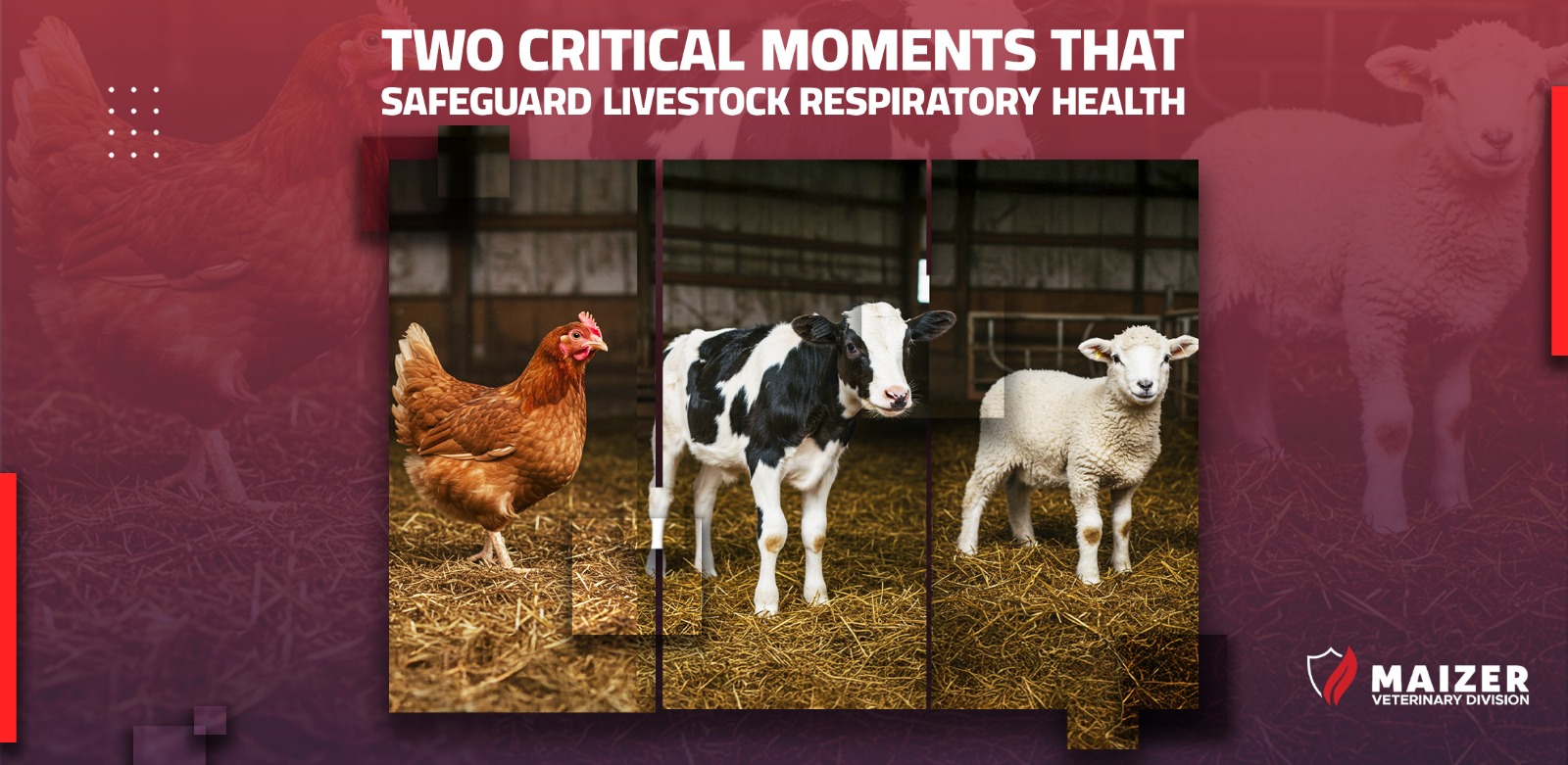Two Critical Moments That Safeguard Livestock Respiratory Health
Abstract
Maintaining respiratory health in livestock requires the same rigorous, layered approach used successfully for managing gut health and preventing other diseases. Globally, respiratory illnesses cost producers an estimated US $5 billion each year in lost productivity and treatment expenses. Historical evidence from essential‑oil‑based enteritis protection, balanced anticoccidial strategies, and diarrhea management clearly indicates that single‑treatment approaches frequently fall short. This blog examines two crucial intervention points in respiratory health management where Menthizer, a natural supplement enriched with eucalyptus, menthol, mint oil, and calcium propionate, has consistently delivered outstanding results across multiple animal species, including poultry, calves, goats, and sheep. Specifically, we spotlight (1) rapid early intervention that halts mild symptoms before they escalate and (2) sustained post‑antibiotic recovery support that secures long‑term respiratory resilience.
Introduction
Livestock respiratory health depends on a two-pronged approach: responding quickly to the initial indication of distress and providing all-encompassing recovery assistance. Research indicates that farms using this strategy can cut outbreak-related losses by as much as 35%, highlighting how crucial early and ongoing interventions are. In sheep, goats, calves, and poultry, these pivotal moments have frequently meant the difference between containment and expensive outbreaks.
- 1st Moment – Catch It Early
- 2nd Moment – Lock In Recovery
- Real-World Impact – Where Menthizer Saved the Day
- Bottom-Line Results
- Your Practical Checklist
- Key Points
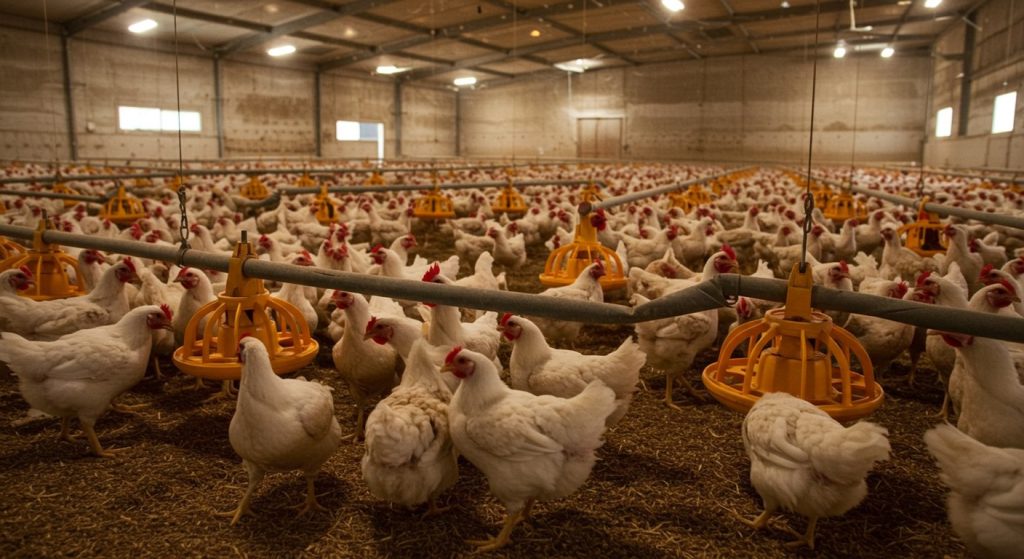
Numerous disease management scenarios have taught the veterinary community the value of multi-layered strategies. We are aware that probiotics by themselves were not enough to treat enteritis in the absence of supplementary strategies like clean litter management and smart barns. Without support for microbiota recovery, anticoccidial drugs did not provide long-term efficacy, and diarrhea treatment in large animals frequently failed without addressing gut-lining repair. Applying this realization, respiratory health necessitates similarly all-encompassing strategies.
Despite the extensive use of herbal preparations for treatment of viral respiratory diseases in poultry, few studies have analyzed the effectiveness of these products. This study aimed to evaluate the effects of three different herbal respiratory symptom relieving agents in broiler chickens experimentally infected with H9N2 avian influenza (AI) and infectious bronchitis (IB) viruses. (Journal of Herbmed Pharmacology)
Menthizer is designed by Maizer (a manufacturing company in France) specifically for respiratory issues and is ideal for both quick intervention and long-term healing. Menthizer, which has shown significant effectiveness in sheep, goats, calves, and poultry, has been particularly helpful in two critical stages: early intervention and post-antibiotic recovery.
1st Moment – Catch It Early
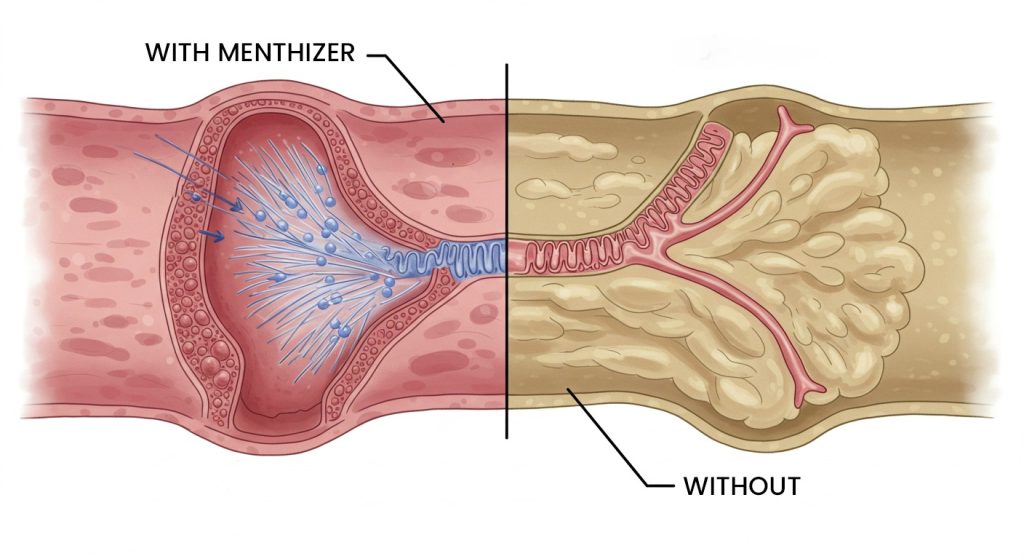
Mild sneezing, light wheezing, or decreased feed intake are common early signs of respiratory distress. According to a 2024 survey of 30 broiler farms in the Midwest, producers who neglected to address these early indicators for more than 24 hours saw an average mortality rate increase from 2% to 8% and lost almost 0.7 kg of market weight per bird in just one week. Delaying treatment permits these symptoms to worsen, which may result in permanent lung damage and large financial losses. Early detection and prompt care are essential.
Essential oils like eucalyptus and menthol have been shown to reduce airway inflammation, thin mucus, and improve mucociliary clearance—the respiratory system’s natural defense mechanism—which helps explain why prompt action is crucial. These organic substances successfully enhance respiratory health and aid in halting the spread of pathogens. (EW Nutrition, 2020).
Eucalyptus oil-based botanical formulations such as Grippozon have demonstrated notable mucolytic qualities in poultry operations, lowering mucus viscosity and thereby inhibiting bacterial growth in the respiratory system. This preserves flock health and successfully stops the spread of pathogens (EW Nutrition, 2020).
Blends containing menthol and eucalyptus significantly decreased pneumonia cases in calf studies, increasing feed consumption in the crucial early stages of infection (Coelho et al., 2023). Likewise, field studies on sheep and goats showed that herbal remedies effectively took the place of traditional antibiotics, enhancing respiratory and general health (Little Avalon Farm, 2022).
2nd Moment – Lock In Recovery
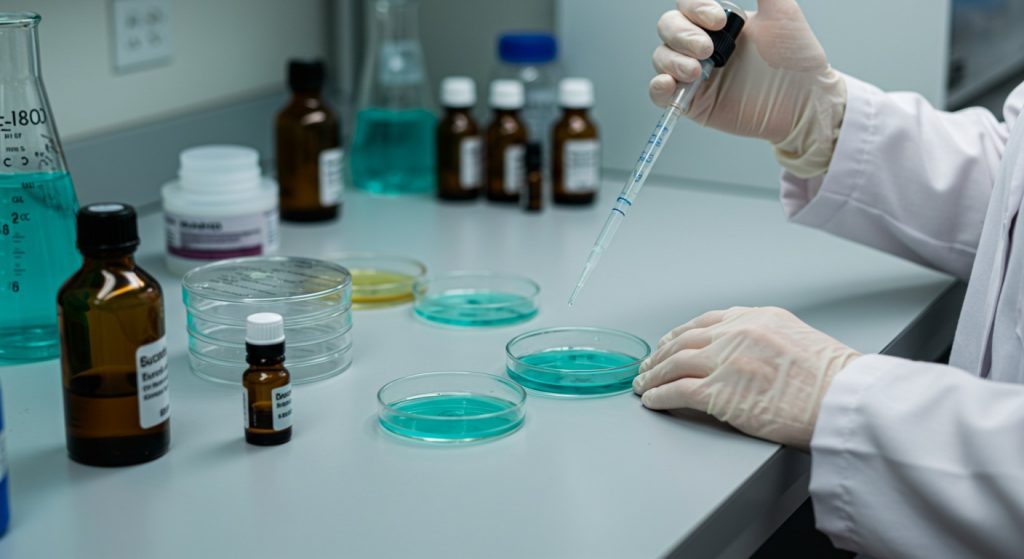
The threat frequently lingers after infection: ciliary function may still be impaired, inflammation and mucus buildup may continue. Traditional therapies usually conclude too soon, which increases the risk of relapse and has a long-term financial impact.
Comprehensive recovery support is provided by continuing to administer Menthizer for an extra three to five days after taking antibiotics. While menthol facilitates breathing and airway clearance, eucalyptus oil, particularly through its constituent 1,8-cineole, offers significant anti-inflammatory and antioxidant benefits. (EW Nutrition, 2020).
But care must be taken. Poorly prepared herbal blends can worsen symptoms by dramatically raising mucus hypersecretion and goblet cell activity, according to a study by Abbasnia et al. (2020). Mucus plug formation, airway blockage, severe respiratory distress, and even death may result from this. Therefore, for herbal treatments to be both safe and effective, careful formulation and precise dosing are essential factors. (Abbasnia et al., 2020).
Real-World Impact – Where Menthizer Saved the Day
Evidence from the field highlights Menthizer’s usefulness:
- Layer Flock Turnaround (Canada, Ontario, 2023): Despite using broad-spectrum antibiotics, a commercial layer farm in Ontario with 40,000 birds reported chronic coughing and a 6% decrease in egg production. Coughing stopped within 48 hours and egg production returned to normal in five days after giving Menthizer via drinking water and a 20-minute misting session. This was twice as quick as the nearby control flock that only received antibiotics (Farm Report CA‑ON‑23‑07).
- Feedlot Calf Revival (USA, Nebraska, 2024): Animals that remained anorexic and lethargic following a seven-day course of tulathromycin were given a menthol-eucalyptus drench (Menthizer, 1 mL/40 kg BW) in a controlled 120-head calf trial at a feedlot in Nebraska. Compared to untreated controls, treated calves exhibited a 50% decrease in relapse pneumonia and a 34% increase in dry matter intake within 48 hours (University Extension Study NE‑BRD‑24‑02).
Bottom-Line Results
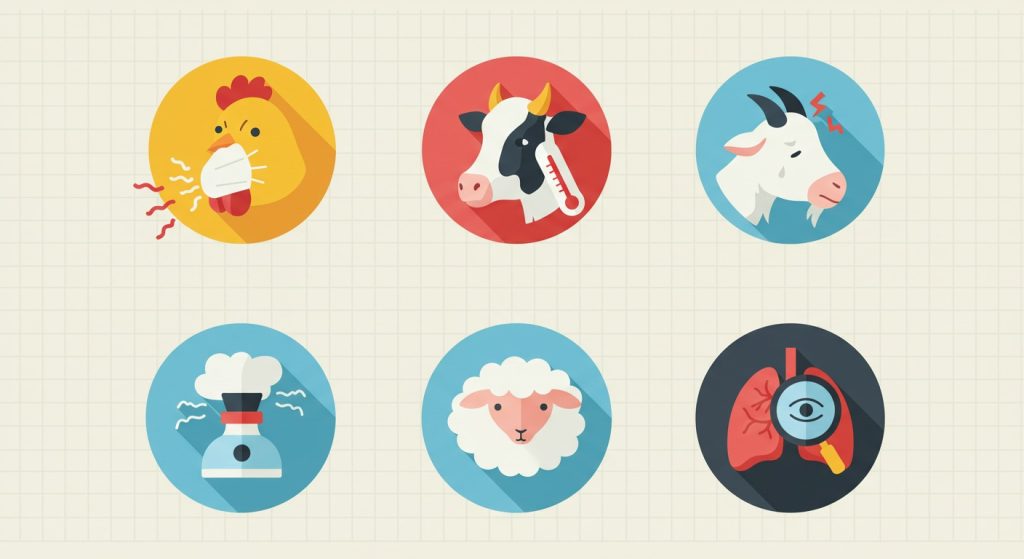
- Reduces the use of antibiotics during calf operations by as much as 20% (Coelho et al., 2023)
- Supports respiratory health by encouraging efficient mucociliary clearance (EW Nutrition, 2020)
- Avoids problems brought on by excessive mucus production from poorly made products (Abbasnia et al., 2020)
- Several species have been shown to be safe with no withdrawal period, making it simple to incorporate into different management systems (EFSA, 2025)
Your Practical Checklist
Treatment Steps
- Guidelines for Dosage: Ruminants: 1 mL per 40 kg body weight; poultry: 1 L per 2 000 L of drinking water
- Start the Treatment: Start as soon as respiratory distress symptoms appear (cough, nasal discharge).
- Maintain Your Treatment: After finishing any antibiotic course, continue taking the medication for at least three days.
Monitoring Steps
- Everyday Verifications: Monitor the animal’s general behavior, feed and water intake, and breathing rate.
- The threshold for action: If the temperature rises above 41°C or the symptoms don’t go away in 48 hours, see a veterinarian.
Key Points
- Timely intervention and ongoing post-infection care are essential for the effective management of respiratory diseases.
- Menthizer blends natural ingredients with mucolytic, antimicrobial, and immune-boosting qualities.
- Effectiveness has been shown in a variety of livestock species, filling in the gaps that traditional antibiotics cannot. Proper dosage and product quality are essential to preventing side effects linked to herbal solutions that are not properly balanced.
- Safe and residue-free, supported by solid scientific data and useful results
Menthizer is a crucial solution for dependable respiratory relief and improved animal health management; it has been shown to be successful both in theory and in practical applications.

